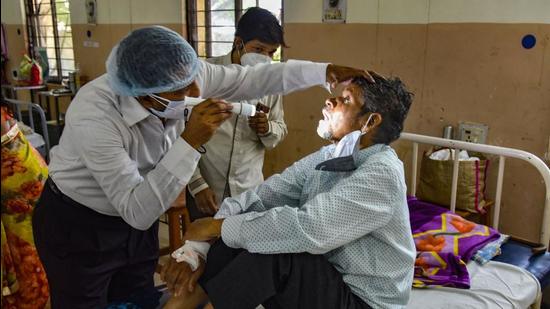Battling a new epidemic
India’s endemic health care issues have now led to a rise in black fungus cases. Both the pandemic, and now the epidemic, have shown the acute harm caused by endemic problems
India’s Covid-19 pandemic now appears to have an epidemic within it. The Union government told the Delhi High Court on Thursday that at least 7,251 people have mucormycosis. Typically, the number of people who get this disease over an entire year is a fraction of the current caseload across the country. The fungus that causes the disease is found in soil and decaying organic matter such as fruit and vegetables, and is as ubiquitous in the natural environment as the immunity to it among healthy people. But that has changed this year as Covid-19 swept the country, exposing endemic problems in how India and Indians approach health care. These are spread over a wide spectrum of issues involving hygiene, a lack of understanding of best practices, a tendency to self-medicate and even misinformation.

Doctors and the government experts say mucormycosis infections — also called black fungus cases — are occurring in people who have high blood sugar and have been given strong doses of steroids or immunosuppressants to calm an immune system kicked into overdrive by Covid-19. For more than 12 months now, medical practitioners have known how to choreograph an immune response so that a patient is not unnecessarily vulnerable while stopping immune cells known as cytokines from destroying tissues in the lungs and elsewhere. In multiple press conferences, the government’s experts have urged doctors to not prescribe immune-suppressing steroids too early, and for more attention to be given to people with high blood sugar that makes them vulnerable to opportunistic pathogens. Those warnings now appear to have been inadequate.
While the exact triggers of the mucormycosis outbreak will slowly be worked out, anecdotal evidence offers several explanations. People have been self-medicating with steroids, which are cheap and are seen as lifesavers in Covid-19; India has a large number of people with uncontrolled diabetes; and India’s medical facilities — particularly in smaller towns and villages — lack adequate hygiene. While the second and third factors have more to do with structural problems, the first highlights the need for citizens to go by proper medical advice and for the government to make it available. It also brings into focus the lack of proper checks on drugs sales, an old concern in a country known for overuse of antibiotics. Both the pandemic, and now the epidemic, have shown the acute harm caused by endemic problems. Don’t let these persist.
All Access.
One Subscription.
Get 360° coverage—from daily headlines
to 100 year archives.



HT App & Website







